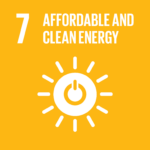The study developed an Energy Transition Readiness Index using 14 variables grouped into three key indicators: clean energy initiatives, economic resilience, and governance capacity.
As the world moves toward renewable energy to combat climate change, a new study reveals that Indonesia’s provinces are far from prepared to make the leap. With 32 out of 34 provinces falling behind in readiness, the nation’s ambitious energy transition goals face steep challenges.
Despite some bright spots, such as Jakarta and Yogyakarta, the research underscores the disparities in energy transition preparedness across Indonesia. The findings highlight the need for tailored, region-specific approaches rather than a one-size-fits-all strategy.
RELEVANT SUSTAINABLE GOALS



The Index of Readiness: A Snapshot of Indonesia’s Energy Transition
The study by Center of Economic and Law Studies(CELIOS) developed an Energy Transition Readiness Index using 14 variables grouped into three key indicators: clean energy initiatives, economic resilience, and governance capacity. This comprehensive approach analyzed data from more than 84,000 villages and urban neighborhoods, offering insights into local and provincial preparedness.
The results were stark:
- High Readiness: Only Jakarta and Yogyakarta scored high, signaling robust economic resilience and strong clean energy initiatives.
- Medium Readiness: 20 provinces, including Bali and Southeast Sulawesi, showed moderate progress but lacked widespread adoption of renewable technologies.
- Low Readiness: Eight provinces, such as Papua, West Papua, and Bangka Belitung, were deemed the least prepared, hindered by limited governance capacity, economic struggles, and minimal clean energy adoption.
Challenges Facing Indonesia’s Energy Transition
Several factors contribute to the nation’s slow progress toward renewable energy adoption:
1. Economic Barriers
Transitioning to renewable energy often comes with high upfront costs. For example, installing solar panels at home can range from Rp17 million to Rp51 million—an expense out of reach for many Indonesians prioritizing basic needs like food and housing.
Economic resilience, measured partly by the issuance of poverty certificates (SKTM), revealed a worrying trend. For instance:
- West Papua, with only 19,198 SKTM certificates issued in 2020, struggles to identify and address widespread poverty.
- North Kalimantan issued just 14,969 SKTM certificates despite significant poverty levels, reflecting weak governance structures.
2. Limited Clean Energy Initiatives
The adoption of clean energy technologies remains concentrated in high-readiness provinces. Jakarta leads the way with 118 electric vehicle charging stations, far outpacing combined totals in regions like Sulawesi, Kalimantan, Maluku, and Papua.
In Papua, a lack of infrastructure exacerbates the problem. For example, the use of solar panels in rural areas is negligible due to poor road access and limited affordability.
3. Governance Challenges
Corruption and inefficiency further hinder progress. Bangka Belitung, notorious for illegal tin mining scandals, scored just 32.97 out of 100 in governance capacity—barely above Papua’s 15.56. Weak governance creates barriers to implementing and managing renewable energy projects effectively.
Bright Spots in the Energy Transition
Jakarta and Yogyakarta stand out as examples of what’s possible with strong governance and community engagement.
- Jakarta: The capital boasts widespread use of solar power, robust infrastructure for electric vehicles, and public awareness campaigns promoting clean energy. With revenues of Rp65.57 trillion in 2021, Jakarta has the fiscal flexibility to invest in renewable technologies.
- Yogyakarta: Known for its progressive policies, Yogyakarta has long offered affordable credit for farmers and small businesses to adopt green technologies. Its proactive governance and smaller population size make it a leader in energy transition readiness.
Opportunities for Medium-Readiness Provinces
Provinces like Bali and Southeast Sulawesi show potential for improvement. Bali has already implemented solar power in public buildings and hotels, but scaling up adoption across all sectors remains a challenge.
To accelerate progress, these provinces must:
- Strengthen Economic Resilience: Develop affordable financing options for renewable energy adoption.
- Expand Clean Energy Initiatives: Increase accessibility to electric vehicle infrastructure and renewable technologies.
- Enhance Governance: Focus on transparency and efficiency in managing energy transition projects.
A Tailored Approach to Energy Transition
The study warns against a one-size-fits-all approach, advocating for policies tailored to each region’s unique challenges and opportunities. For instance, East Kalimantan, with moderate readiness overall, ranks among the top five provinces for clean energy initiatives but struggles with governance issues. Addressing these gaps requires targeted interventions.
Indonesia’s energy transition will require collective action from government agencies, the private sector, and civil society. Enhanced collaboration can drive innovation, secure funding, and build public trust—essential components for achieving the country’s renewable energy goals.
The findings of this study underscore the complexity of Indonesia’s energy transition. While Jakarta and Yogyakarta provide a glimpse of what success looks like, the disparities across provinces highlight the need for a just and equitable approach.
By tailoring strategies to local contexts, investing in economic resilience, and addressing governance challenges, Indonesia can navigate these obstacles. Achieving its renewable energy ambitions won’t be easy, but with bold action and collective commitment, the nation can pave the way for a sustainable future.
Lead image courtesy of nazar_ab from Getty Images Signature (Renewable Energy Landscape)
You may also be interested in :
Indonesia Vows To End Coal Power Plants in 15 Years, Transition To Renewable Energy


